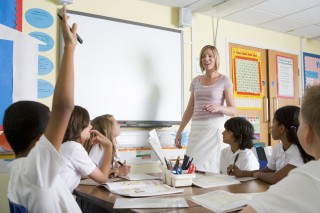So, you managed to make it through your last placement, perhaps in KS1 or LKS2. The heady glow of completion, although fast becoming a distant memory, still brings a smile and sense of relief. Even if you experienced the usual wobbles along the way, you appreciate that this is all part of the learning curve; the frequent challenges of becoming a better teacher.
Armed with your targets and feeling suitably rested, you make your way to meet your tutor to discover your fate about where your next placement will be. You may feel a sense of excitement and anticipation, a keenness to get started, particularly if this is your final year. Then, without warning, the world turns dark as you're plunged into a blind panic. You've been placed in year 6! Your head spins, your mouth becomes dry and you start sweating as you manage a weak grimace in response.
Alright, perhaps this is a tad over-dramatic but if you've ever received the news that your placement is in year 6, then I'm sure you can appreciate the apprehension, even fear, which many trainees I've worked with over the years say that they initially feel in this situation. Maybe this stems from personal recollections of being a pupil in year 6, with the dreaded SATs tainting everything. Perhaps you've sat in on staff meetings previously and listened to worried conversations between year 6 staff, concerned about progress and evidencing it by the end of the term.
If this sounds familiar then it's time to bust some myths and, hopefully, set your mind at rest so that you can move toward your placement confidently and with an open mind. I've approached this by answering questions trainees have
Firstly, though, a small disclaimer: every school is different. The following tips are based on my experience of teaching year 6 classes over a number of years. You will obviously need to follow your placement school's lead and expectations, and you may experience different approaches. The majority of schools will have similar concerns regarding this year group, however, in part because SAT results provide
To begin with, let's set year 6 in the wider context of the school. Emphasis on the learning taking place in previous years is becoming even more important with the introduction of the 'new' National Curriculum in 2014. A year 6 teacher's task is to build on what has gone before, rather than cramming for the tests, which has perhaps been a perceived view of teaching this year in the past. Year 6 is about more than just the SATs – similarly, pupils' performance in these tests is about more than their learning and achievement in year 6 alone.
On
Can I teach 'creatively' in year 6?
Most definitely yes! Remember that writing achievement, for example, is not assessed by SATs, it is teacher-assessed and evidenced across a range of genres and subjects. Cross-curricular writing opportunities are therefore particularly important. Most schools now use a medium-term planning approach in year 6 to provide a number of opportunities to approach the subject creatively across the curriculum – with an emphasis on the 'immersion' phase, where pupils are surrounded by examples and experiences of the genre they're studying.
This can include a 'wow moment' and many other creative approaches. I observed an amazing introductory lesson to diary writing in year 6 where a trainee dimmed the lights, played crackling fire sounds and entered the classroom by glowing candlelight dressed as Samuel Pepys, quoting extracts from his diary, to the children's gasps of wonder and anticipation.
Some creative examples from my own practice include a "Bear Grylls Maths Challenge Week", tackling gaps in pupils' mathematical understanding using the outdoor area, plus daily survival-based problems involving mathematical concepts. And, during the same term, I set up a tent and props in the classroom – complete with blizzard sound effects and hot-seated pupils as Captain Scott – for a unit on biography. They then wrote in-role – it was truly awe-inspiring and the class talked about the session for weeks afterwards.
What about SATs?
Many schools begin preparing pupils for what to expect in SATs from January or after February half-term. You may see some papers or SAT questions being used prior to this, but you're unlikely to see anything more intensive at this stage.
If you are required to include them in your teaching, you can use SAT questions creatively, for example as part of a plenary or a paired challenge. Individual questions can be matched to your learning objective or adapted to suit your lesson/theme. You can also walk pupils through the question and discuss approaches to each stage as part of a shared session. This approach can be particularly beneficial and helps familiarise pupils with the type of questions they will be expected to answer and how to approach them. I sometimes like to play 'Silent Teacher' in Maths where I stand at the board and take direction on how to solve a problem from the children's explanations, showing the calculations as I go. Using this method you can make deliberate errors for the children to spot and correct, and you can also look puzzled, prompting the class to provide clearer justifications.
And how about subject knowledge? Doesn't everything become much more difficult in year 6?
Is behaviour management likely to be more of an issue in year 6?
Not necessarily. Many year 6 classes enjoy the responsibility that comes with being the oldest children in the school and will (mostly) be great role models for the younger pupils. The "big fish in a small pond" outlook tends to come towards the end of the year for some pupils and behaviour can become more challenging for a few.
I have taught classes where both of the above situations have been the case. Follow the school's behaviour policy to the letter, be consistent and firm but fair from day 1. Year 6 children are only too aware that this is their SAT year and some can worry unnecessarily about this. This is something to be mindful of in your approach and pastoral care.
Some closing advice ...
Be positive not fearful. Of all the year groups I have taught, year 6 is by far my favourite and I'm certain many of you will feel the same after placement. Pupils are usually more independent and mature, they respond enthusiastically to challenges and different approaches and most classes have bonded well and are therefore a great team.
I know of many trainee teachers who have been worried about expectations around a placement in year 6 and may, at the outset, have doubted their own ability to manage the situation. However, they have always finished their placement as more confident and empowered teachers. It's an excellent experience for your professional development and will also be a great addition to your CV.
Most importantly, enjoy your year 6 placement. Good luck!
Nicola Lark-Spain is a specialist English teacher currently teaching in the primary sector. She is also an English lead co-ordinator, a freelance writer and a sessional university tutor working with trainee teachers. She tweets at @LittleNikkiLS

